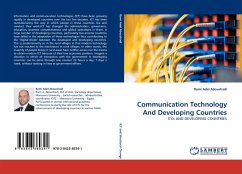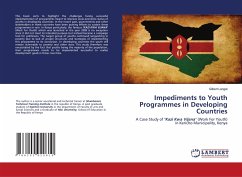
Communication Technology And Developing Countries
ITCs AND DEVELOPING COUNTRIES
Versandkostenfrei!
Versandfertig in 6-10 Tagen
39,99 €
inkl. MwSt.

PAYBACK Punkte
20 °P sammeln!
Information and communication technologies (ICT) have been growing rapidly in developed countries over the last five decades. ICT has been revolutionizing the way in which people in these countries live and conduct their work,ICT has changed the administration, governance, education, business competitiveness and global operations in them. A large number of developing countries, particularly low-income countries have failed in the adaptation of these technologies thus contributing to the "digital-divide" between the developed and developing countries. This is predominantly so in the rural villa...
Information and communication technologies (ICT) have been growing rapidly in developed countries over the last five decades. ICT has been revolutionizing the way in which people in these countries live and conduct their work,ICT has changed the administration, governance, education, business competitiveness and global operations in them. A large number of developing countries, particularly low-income countries have failed in the adaptation of these technologies thus contributing to the "digital-divide" between the developed and developing countries. This is predominantly so in the rural villages in that modern technology has not reached to the institutions in rural villages. In other words, the majority of people living in rural areas have neither access nor the means to obtain modern ICT because of their low economic position. Imagine a situation in which all interaction with the government in developing countries can be done through one counter 24 hours a day, 7 days a week, without waiting in lines at government offices.












